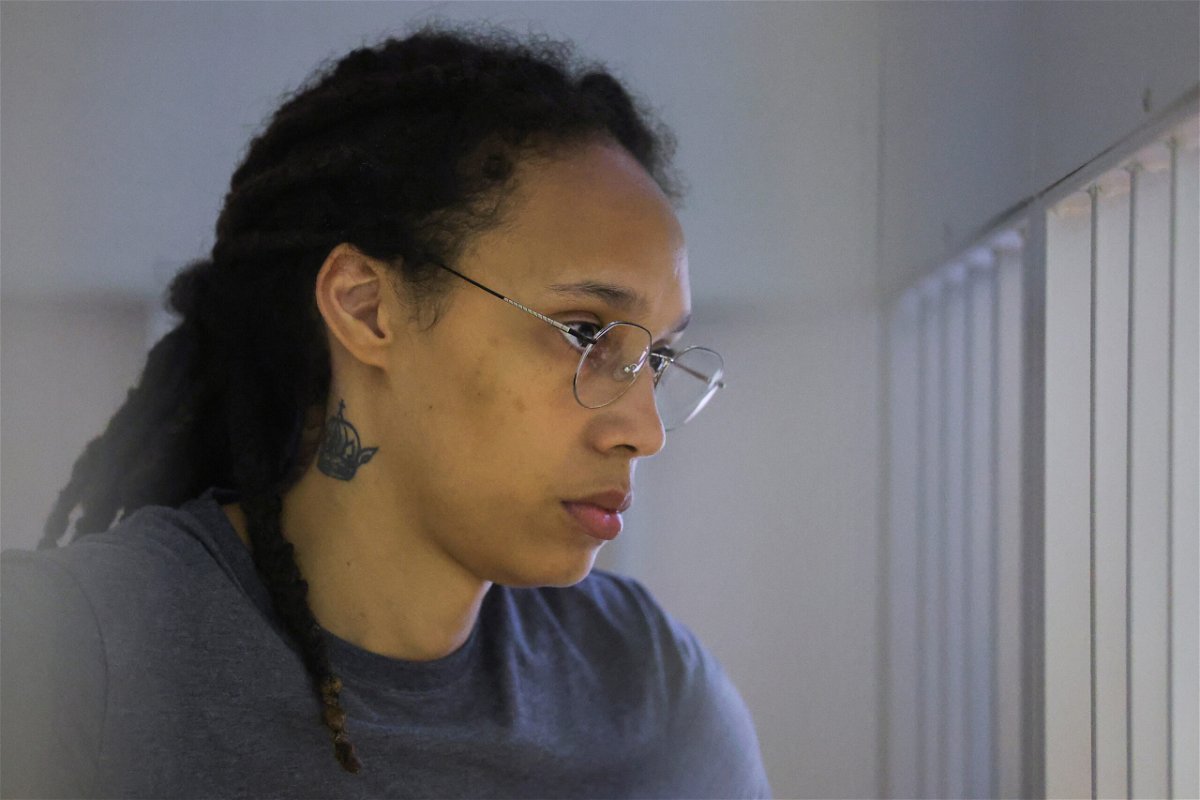Brittney Griner has been transferred to a penal colony in western Russia, her lawyers say

Brittney Griner stands inside a defendants' cage before the verdict in a court hearing in Khimki outside Moscow on August 4. Griner has been transferred to a penal colony in Yavas
By Frederik Pleitgen, Kylie Atwood, Eliott C. McLaughlin and Rob Picheta, CNN
American basketball star Brittney Griner has been transferred to a penal colony in Yavas, in the western Russian region of Mordovia, her lawyers said Thursday, ending days of speculation over her whereabouts.
Her lawyers, Maria Blagovolina and Alexander Boykov, thanked everyone who has reached out in support.
“First, on behalf of Brittney, we would like to thank everyone who has expressed care for her,” they said in a statement. “We can confirm that Brittney began serving her sentence at IK-2 in Mordovia.
“We visited her early this week. Brittney is doing as well as could be expected and trying to stay strong as she adapts to a new environment. Considering that this is a very challenging period for her, there will be no further comments from us.”
On Wednesday, the US State Department said it had been in touch with Griner’s legal team and was aware of reports she had been sent to a penal colony roughly a seven-hour drive southeast of Moscow.
“However, the Russian Federation has still failed to provide any official notification for such a move of a U.S. citizen, which we strongly protest. The Embassy has continued to press for more information about her transfer and current location,” a spokesperson said.
Griner’s representatives confirmed previously she had been transferred from a detention center in Iksha on November 4 — and that she was destined for a penal colony — but “we do not have any information on her exact current location or her final destination. In accordance with the standard Russian procedure, the attorneys, as well as the U.S. Embassy, should be notified upon her arrival at her destination. Notification is given via official mail and normally takes up to two weeks to be received.”
The Olympic gold medalist and onetime WNBA champ is trying to remain strong after nine months separated from her loved ones, her agent, Lindsay Colas, said.
“At this time, we will not be sharing any further details, but want to express our deepest thanks to the Biden Administration, the Richardson Center, and to everyone who has reached out to offer words of encouragement to her,” she said. Letters have poured in from around the world and BG has been buoyed by the support. Each letter matters and we encourage everyone to continue to write and share your support.”
The Richardson Center for Global Engagement “promotes global peace and dialogue by identifying and working on areas of opportunity for engagement and citizen diplomacy with countries and communities not usually open to more formal diplomatic channels,” its website says.
The primary concern has been Griner’s health and well-being, Colas said earlier this week.
While conditions vary in Russian penal colonies, political prisoners are often placed in harsh conditions where they can be subjected to “solitary confinement or punitive stays in psychiatric units,” the State Department’s human rights report says.
Russian law also allows forced labor in penal colonies, and in some cases, inmates have been tortured to death, the report says. There also are reports of prison authorities recruiting inmates to abuse other inmates, the report adds.
That Griner’s team did not know her whereabouts earlier is not unusual. Transfers to penal colonies are secret processes in Russia, with relatives and lawyers often unaware of where a prisoner is being sent for several days, according to Amnesty International.
Last month, Griner lost her appeal against a nine-year drug sentence. She was detained in February and convicted in August after acknowledging she had vape cartridges containing cannabis. She has repeatedly apologized for bringing a small amount of the substance into the country, where she played basketball in the offseason.
Mordovia is the same region where American Paul Whelan is being held. The former U.S. Marine is serving 16 years in a different penal colony on espionage charges he denies.
Griner’s detention has raised concerns she is being used as a political pawn in Russia’s war against Ukraine.
Most of Russia’s prisons are penal colonies, where inmates are housed in barracks and are often put to work, according to a report by Poland-based think tank the Centre for Eastern Studies, known as the OSW. More than 800 such facilities existed across Russia as of 2019, the organization said.
Built during the Soviet Union, most of the colonies have been likened to Soviet-era gulags; prison camps that expanded across the region during Josef Stalin’s rule in the mid-20th century.
Russia houses nearly half a million prisoners in its facilities, one of the highest rates in Europe, according to the World Prison Brief, but numbers have declined in recent years — in contrast to most parts of the world.
The level of supervision and restrictions placed on inmates today depends on the facility to which they’re sentenced. Not all require labor, but several high-profile dissidents, activists and foreign nationals who have been sent to colonies describe harrowing and difficult experiences.
Inmates are often taken vast distances across the country. Journeys to colonies are dangerous and can last as long as one month, according to Amnesty International. The trips often take place in cramped train carriages, and inmates often arrive in overcrowded facilities with poor and aging infrastructure, the OSW found.
“Despite several attempts to reform the prison system in Russia, they still resemble the Soviet Gulag,” the organization said. “Human rights violations and torture are common.”
The-CNN-Wire
™ & © 2022 Cable News Network, Inc., a Warner Bros. Discovery Company. All rights reserved.
CNN’s Matthew Chance, Zahra Ullah, Anna Chernova, Abby Phillip and Rhea Mogul contributed reporting.